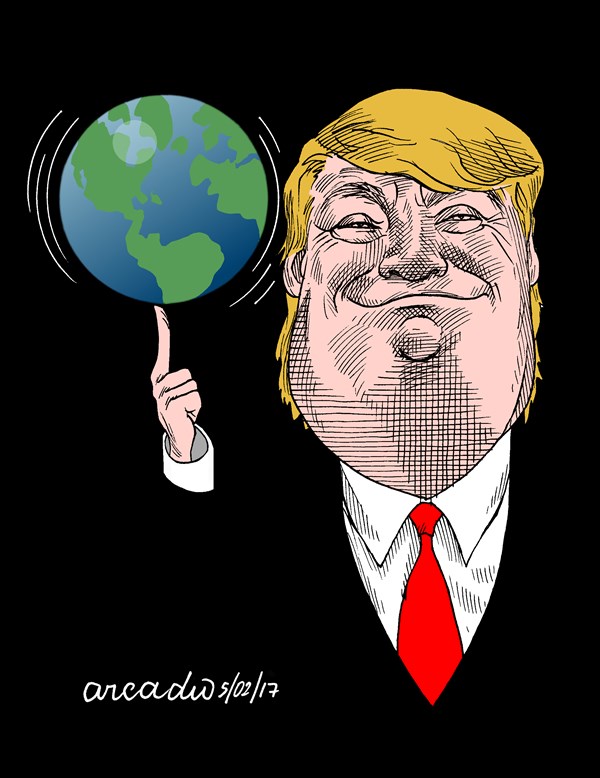
How committed is President Donald Trump's administration to preserving a stable balance of power in Asia?
If you go by the rhetoric and the policy documents released thus far, the answer is clear: very. Trump's national security team, from Secretary of State Marco Rubio and Defense Secretary Pete Hegseth to Elbridge Colby, the Pentagon's top policy official, is stocked with people who can be described as certified China hawks. All three are extremely concerned about Beijing's ongoing military modernization — China already has the largest navy in the world and the biggest missile stockpile in Asia. And China has a heightened propensity for risk and a man in Xi Jinping who seems to relish getting into altercations with U.S. allies in the region's disputed waterways. The so-called median line separating Chinese and Taiwanese airspace, which used to be respected as a de facto boundary, is increasingly irrelevant in the eyes of China's People's Liberation Army.
Washington, of course, knows all of this and has responded with barbed words. During a trip to Japan in March, Hegseth stated that “America and Japan stand firmly together in the face of aggressive and coercive actions by the Communist Chinese.” A day before that speech, Hegseth and his counterpart from the Philippines agreed to schedule more bilateral military exercises with the aim of boosting Manila's capacity to resist China's gray zone activities. The Pentagon's interim policy guidance cites deterring a Chinese invasion of Taiwan, the self-governed island that Beijing claims, as one of its top objectives. And in an April memorandum, Hegseth supplemented that guidance by pressing the U.S. Army to reorganize and refit itself with one big mission in mind: “deterring China in the Indo-Pacific region.”
Yet take a deeper look, and it becomes clearer that the Trump administration's actions haven't synced with its words. The first four months of Trump's second term have instead been drowned out by the kinds of rapid-fire crises that often distract from longer-term priorities.
In the Middle East, a region Trump has consistently railed about, the United States channeled additional military hardware into a seven-week war against the Houthis in Yemen to bolster its deterrent against Iran as nuclear talks continue to progress. Six B-2 long-range bombers, a third of the Air Force's B-2 fleet, were deployed to the Diego Garcia air base in the Indian Ocean. Additional fighter aircraft were sent to the Persian Gulf. The Defense Department ordered the USS Harry S. Truman carrier strike group to stay in the region past its deployment date, and it redeployed another aircraft carrier, the USS Carl Vinson, to the Middle East from the Indo-Pacific. A Patriot air defense battalion was also shifted from Asia to the Middle East, which required 73 flights to pull off.
The U.S. air war against the Houthis, meanwhile, was happening at such a frenetic pace that U.S. military officers responsible for Asia were alarmed about a shortage of precision-guided munitions, which Washington would need for a potential conflict with China. Although the air campaign against the Houthis stopped after Trump arrived at a ceasefire deal with the Yemeni rebel group in early May, there hasn't been much of a change in the U.S. force posture to date. The B-2s on Diego Garcia have been replaced with B-52s. And while one aircraft carrier, the USS Truman, is now in the Mediterranean serving Washington's operations in Europe, another, the USS Nimitz, is traveling from the South China Sea to the Indian Ocean, possibly on its way to the Persian Gulf.
It's not only the Pentagon's resources that are being affected. Washington's diplomatic energy these days is focused less on Asia and more on the Middle East and Europe — or more specifically, on Iran, Gaza and Ukraine.
All three of these problem sets require extraordinary amounts of time and preparation to manage, let alone resolve. On Ukraine, Trump has preferred to get involved himself, calling Ukrainian President Volodymyr Zelenskyy, Russian President Vladimir Putin and European leaders in an attempt to make progress on ending Europe's most destructive war in eight decades. Thus far, success has been elusive; while Ukrainian and Russian officials met this month for the first time in more than three years, no concrete outcomes were reached outside of a large prisoner exchange. Despite European frustration with Putin's maximalist demands, Trump still doesn't want to throw in the towel and give up on a diplomatic endeavor he campaigned on.
The diplomacy on Gaza is even less hopeful for Trump than the diplomacy on Ukraine. The war in the Palestinian enclave is heading into its 20th month, with Israel and Hamas no closer to ending the fighting today than they were when it started. In fact, Israeli Prime Minister Benjamin Netanyahu has stated outright that ending the war is not going to happen until Hamas disarms and moves out of Gaza, two conditions the Palestinian terrorist group views as surrender terms. Trump is perturbed by the lack of movement but is nevertheless still ordering his envoy Steve Witkoff to continue his efforts.
The talks with Iran, meanwhile, continue at a steady clip. The fifth round of diplomacy talks ended May 23, with both sides cautiously optimistic that a final end product could be achieved. But we are nowhere near an agreement, which means U.S. officials have more work to do.
Through it all, Asia is getting the short end of the stick. The United States is still the world's primary superpower, but that doesn't make it superman. No country has endless resources. Sacrifices need to be made. Expending energy on one region will inevitably mean withdrawing energy from another. And right now, regardless of what Hegseth and Rubio may say, U.S. policy in Asia is the sacrificial lamb.
Previously:• 03/27/25 Is Europe stepping up to the plate?
• 03/21/25 Trump goes to war in Yemen
• 01/23/25 Let's not overreact to Gaza ceasefire
• 01/21/25 Are Trump's peace dreams for Ukraine mission impossible?
• 12/31/24 How will Syria evolve under new leadership?
• 11/14/24 How will Trump handle the war in Ukraine?
• 11/04/24 Is there really an 'axis of evil' set on destroying the US?
• 11/30/23 What will happen after the Israel-Hamas truce expires?
• 11/09/23 Pessimism is growing in Ukraine. Has the war with Russia reached a stalemate?
• 10/26/23 Biden's geopolitical equivalent of a high-wire act --- and success is by no means assured
• 10/12/23 How will the Israel-Hamas conflict affect US policy?
• 10/05/23 As the war in Ukraine grinds on, Europe will prove more crucial
• 09/18/23 The US and Vietnam should boost their relationship. China looms large
• 08/24/23 Zelensky's shiny, new toys and yet --- racking-up losses
• 08/17/23 The US is negotiating with Iran to release prisoners. Here's why that matters
• 08/03/23 What should the US do to normalize ties between Israel and Saudi Arabia?
• 06/09/23 Do we face nuclear confrontation? The erosion of agreements has heightened the risk
• 06/01/23 Why is the Defense Department immune from budget cuts?
• 05/18/23 Policy is at a crossroads in a deeply troubled Afghanistan
• 05/12/23 The US war on terror continues. We just don't talk about it
• 05/05/23 The US and world were naive about Sudan leaders' commitment to democracy
• 03/20/23 China gets the credit for improving Iran-Saudi Arabia ties --- but the US benefits
• 02/23/23 The first year of war in Ukraine has defied predictions
• 02/07/23 How does the US-China relationship continue after the spy balloon saga?
• 12/29/22 Why does the US defense budget continue to grow? America's approach needs rethinking
• 12/22/22 Ever so slowly, the nations are realigning
• 12/22/22 China is pushing a pacifist Japan into building up its military capabilities
• 12/09/22 Mideast country is putting US in a tough spot by threatening another Syria incursion
• 10/13/22 Don't underestimate the durability of autocracies
• 09/22/22 Is there still hope for a new Iran nuclear deal?
(COMMENT, BELOW)
Daniel DePetris
Chicago Tribune/(TNS)
Daniel R. DePetris is a fellow at Defense Priorities, a foreign policy think tank based in Washington, D.C., and a syndicated foreign affairs columnist for the Chicago Tribune.


 Contact The Editor
Contact The Editor
 Articles By This Author
Articles By This Author